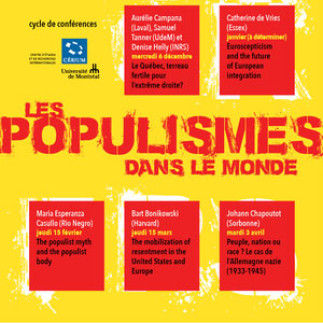Séminaire 2017-2018
Conférencière invités : Maria Esperanza Casullo
Maria Esperanza Casullo is an associate professor at the Universidad Nacional de Río Negro, in Argentina. She was a Visiting Professor at University of Richmond and Brown University. Her main work and research is on democratic theory and on populism, both theoretically and comparatively in Latin America. Her most recent publications are the chapters 'Populist and Programmatic Parties in Latin American Party Systems' and 'Populist Parties of Latin America: the Cases of Argentina and Ecuador' (coauthored with Flavia Freidenberg) in Heinisch, Holtz-Bacha and Mazzoleni (2017) 'Political Populism: a Handbook'. She is published in Revista PostDATA, Social Movement Studies, the Handbook of Latin American Studies and Nueva Sociedad. She is finalizing a book about the use of the populist myth in the discourses of Hugo Chávez, Evo Morales, Néstor and Cristina Kirchner, Donald Trump and Mauricio Macri to be published next June.
Populist mobilization is a powerful thing. Politicians become leaders, political parties rise and fall, regimes change under its pull. But where, exactly does the power of populism come from? The energy that is unleashed by it comes from the representative bond between leaders and followers, but the linkage itself has not been sufficiently theorized. Political science has focused on the how of populism: how do leaders construct their discourses, how they mobilize passions and grievances, how does the populist power benefit from the sense of loss and disruption caused by rapidly changing social circumstances. However, much less--if any--has been written on the why . Why do some people choose to be represented by populist leaders? Why do they become invested in the ideas and words that are presented to them, ideas which they might have rejected not long ago? The talk will present two possible answers to this questions that focus on the ways in which populist leaders talk and act: the first one states that the populist bond is enmeshed in a certain type of discourse, which will be called 'the populist myth'. The second one will focus on the notion of bodily performance as synecdochal representation; this refers to the ways in which the very body of the leader becomes the embodiment of the entrance of the people into political spaces from where they felt excluded before. The populist myths and the populist bodies of several current presidents will be discussed as well.

